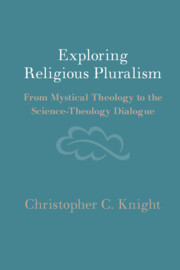Book contents
- Exploring Religious Pluralism
- Exploring Religious Pluralism
- Copyright page
- Epigraph
- Contents
- 1 Introduction
- 2 Apophaticism and Perennialism
- 3 The Philosophy of Religion and Its Limitations
- 4 Philosophy and Noetic Perception
- 5 Philosophy and the Pluralistic Hypothesis
- 6 Beyond Philosophical Argument
- 7 Archetypes and ‘Platonic’ Mysticism
- 8 Noetic Perception and the Role of the Imagination
- 9 The Evolution of Religiosity
- 10 Revelation and Divine Action
- 11 A Pluralistic Model in the Making
- 12 Pluralism or ‘Reciprocal Inclusivism’?
- Afterword
- Bibliography
- Index
Afterword
Published online by Cambridge University Press: 14 March 2024
- Exploring Religious Pluralism
- Exploring Religious Pluralism
- Copyright page
- Epigraph
- Contents
- 1 Introduction
- 2 Apophaticism and Perennialism
- 3 The Philosophy of Religion and Its Limitations
- 4 Philosophy and Noetic Perception
- 5 Philosophy and the Pluralistic Hypothesis
- 6 Beyond Philosophical Argument
- 7 Archetypes and ‘Platonic’ Mysticism
- 8 Noetic Perception and the Role of the Imagination
- 9 The Evolution of Religiosity
- 10 Revelation and Divine Action
- 11 A Pluralistic Model in the Making
- 12 Pluralism or ‘Reciprocal Inclusivism’?
- Afterword
- Bibliography
- Index
Summary
How can we more deeply understand religious pluralism? In this study, Christopher C. Knight suggests that current explorations of religious pluralism may be supplemented by combining new thinking about divine action with the kind of ‘mystical theology’ that sees doctrinal statements as aids to contemplation rather than as philosophical truth claims. While Knight sees the ‘perennialist’ tradition of pluralistic thinking as deeply flawed, he nevertheless proposes that we can adopt a kind of neo-perennialism in which the supposed incompatibilities of different faith traditions may still be seen in the way that perennialists have usually considered them: as relating only to the exoteric dimension of religious faith and practice. In this way, he suggests, the perennialist notion of esoteric ecumenism may still be valid. He cautions, nevertheless, that at a methodological level, there may be defensible reasons to hesitate before adopting a full-blown pluralism of this kind.
- Type
- Chapter
- Information
- Exploring Religious PluralismFrom Mystical Theology to the Science-Theology Dialogue, pp. 205 - 209Publisher: Cambridge University PressPrint publication year: 2024

